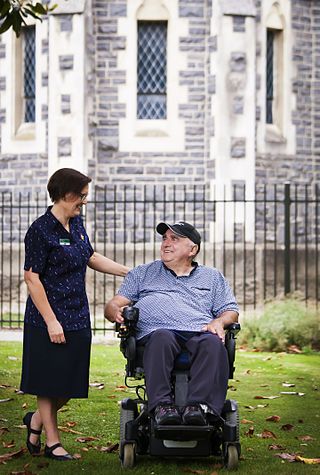
A psychologist is a professional who practices psychology and studies mental states, perceptual, cognitive, emotional, and social processes and behavior. Their work often involves the experimentation, observation, and interpretation of how individuals relate to each other and to their environments.

Mental health encompasses emotional, psychological, and social well-being, influencing cognition, perception, and behavior. It likewise determines how an individual handles stress, interpersonal relationships, and decision-making. Mental health includes subjective well-being, perceived self-efficacy, autonomy, competence, intergenerational dependence, trauma, and self-actualization of one's intellectual and emotional potential, among others. From the perspectives of positive psychology or holism, mental health may include an individual's ability to enjoy life and to create a balance between life activities and efforts to achieve psychological resilience. Cultural differences, subjective assessments, and competing professional theories all affect how one defines "mental health". Some early signs related to mental health difficulties are sleep irritation, lack of energy, lack of appetite and thinking of harming yourself or others.
Psychiatric nursing or mental health nursing is the appointed position of a nurse that specialises in mental health, and cares for people of all ages experiencing mental illnesses or distress. These include: neurodevelopmental disorders, schizophrenia, schizoaffective disorder, mood disorders, addiction, anxiety disorders, personality disorders, eating disorders, suicidal thoughts, psychosis, paranoia, and self-harm.

Emergency psychiatry is the clinical application of psychiatry in emergency settings. Conditions requiring psychiatric interventions may include attempted suicide, substance abuse, depression, psychosis, violence or other rapid changes in behavior. Psychiatric emergency services are rendered by professionals in the fields of medicine, nursing, psychology and social work. The demand for emergency psychiatric services has rapidly increased throughout the world since the 1960s, especially in urban areas. Care for patients in situations involving emergency psychiatry is complex.
Mental disorders are classified as a psychological condition marked primarily by sufficient disorganization of personality, mind, and emotions to seriously impair the normal psychological and often social functioning of the individual. Individuals diagnosed with certain mental disorders can be unable to function normally in society. Mental disorders may consist of several affective, behavioral, cognitive and perceptual components. The acknowledgement and understanding of mental health conditions has changed over time and across cultures. There are still variations in the definition, classification, and treatment of mental disorders.

Psychiatric and mental health nurses in the U.S. Army Nurse Corps employing groundbreaking protocols and treatments in psychiatric issues to address the unique challenges that our service men and women face, more commonly post-traumatic stress disorder and traumatic brain injuries. Most people understand that trauma exposure is a popular occupational hazard for military members. Psychiatric screenings, before and during their enlistment, and treatments after being exposed to warfare, death, destruction, and torture have been extremely beneficial for military personnel and their dependents.

Telepsychiatry or telemental health refers to the use of telecommunications technology to deliver psychiatric care remotely for people with mental health conditions. It is a branch of telemedicine.
A mental health professional is a health care practitioner or social and human services provider who offers services for the purpose of improving an individual's mental health or to treat mental disorders. This broad category was developed as a name for community personnel who worked in the new community mental health agencies begun in the 1970s to assist individuals moving from state hospitals, to prevent admissions, and to provide support in homes, jobs, education, and community. These individuals were the forefront brigade to develop the community programs, which today may be referred to by names such as supported housing, psychiatric rehabilitation, supported or transitional employment, sheltered workshops, supported education, daily living skills, affirmative industries, dual diagnosis treatment, individual and family psychoeducation, adult day care, foster care, family services and mental health counseling.
A mental health counselor (MHC), or counselor, is a person who works with individuals and groups to promote optimum mental and emotional health. Such persons may help individuals deal with issues associated with addiction and substance abuse; family, parenting, and marital problems; stress management; self-esteem; and aging. The United States Bureau of Labor Statistics distinguishes "Mental Health Counselors" from "Social Workers", "Psychiatrists", and "Psychologists".
Pine Rest Christian Mental Health Services is a psychiatric hospital and behavioral health provider, with the main treatment campus located in Gaines Township, Michigan. The Chief Executive Officer and President is Dr. Mark Eastburg, appointed December, 2006.

A caregiver, carer or support worker is a paid or unpaid member of a person's social network who helps them with activities of daily living. Since they have no specific professional training, they are often described as informal caregivers. Caregivers most commonly assist with impairments related to old age, disability, a disease, or a mental disorder.
In the United States, a psychiatric-mental health nurse practitioner (PMHNP) is an advanced practice registered nurse trained to provide a wide range of mental health services to patients and families in a variety of settings. PMHNPs diagnose, conduct therapy, and prescribe medications for patients who have psychiatric disorders, medical organic brain disorders or substance abuse problems. They are licensed to provide emergency psychiatric services, psychosocial and physical assessment of their patients, treatment plans, and manage patient care. They may also serve as consultants or as educators for families and staff. The PMHNP has a focus on psychiatric diagnosis, including the differential diagnosis of medical disorders with psychiatric symptoms, and on medication treatment for psychiatric disorders.

Community mental health services (CMHS), also known as community mental health teams (CMHT) in the United Kingdom, support or treat people with mental disorders in a domiciliary setting, instead of a psychiatric hospital (asylum). The array of community mental health services vary depending on the country in which the services are provided. It refers to a system of care in which the patient's community, not a specific facility such as a hospital, is the primary provider of care for people with a mental illness. The goal of community mental health services often includes much more than simply providing outpatient psychiatric treatment.
Psychiatry is the medical specialty devoted to the diagnosis, prevention, and treatment of deleterious mental conditions. These include various matters related to mood, behaviour, cognition, and perceptions.
Services for mental health disorders provide treatment, support, or advocacy to people who have psychiatric illnesses. These may include medical, behavioral, social, and legal services.

The Utah State Hospital (USH) is a mental hospital located in eastern Provo, Utah, United States of America. The current superintendent is Dallas Earnshaw.
Psychiatric pharmacy, also known as mental health pharmacy, is the area of clinical pharmacy specializing in the treatment of people with psychiatric illnesses through the use of psychotropic medications. It is a branch of neuropsychiatric pharmacy, which includes neurologic pharmacy. Areas where psychiatric pharmacists are found most abundantly are in chemical dependency, developmental disabilities, long-term care facilities, adherence clinics, mental health clinics, and within the prison system. However, psychiatry and neurology are not the only areas where psychiatric pharmacists require comprehensive knowledge. They must also be proficient in clinical problem solving, interprofessionalism, and communication with understanding and empathy for the patient population they serve, as they are a sensitive group.
Mental health in the Philippines is a survey of the status of psychological, psychiatric, and emotional health care in the Philippines from both past and present programs.
Clinical mental health counseling is a healthcare profession addressing issues such as substance abuse, addiction, relational problems, stress management, as well as more serious conditions such as suicidal ideation and acute behavioral disorders. Practitioners may also assist with occupational growth in neurodivergent populations and behavioral and educational development. Clinical mental health (CMH) counselors include psychologists, psychiatrists, mental health technicians, marriage counselors, social workers, and family therapists.
A behavioral change can be a temporary or permanent effect that is considered a change in an individual's behavior when compared to previous behavior. It is sometimes considered a mental disorder, yet it is also a strategy used to improve such disorders. This change is generally characterized by changes in thinking, interpretations, emotions, or relationships. These changes can be either good or bad, depending on which behavior is being affected. Often, it takes much more work to change behavior for the better than it does to experience a negative change. Medications can cause this change as a side effect. The interaction between physiological processes and their effect on individual behavior is the basis of psychophysiology. Several theories exist as to why and how behavioral change can be affected, including behaviorism, Self-efficacy theory, and the stages of change model.









